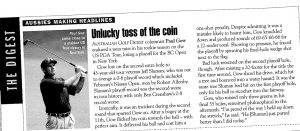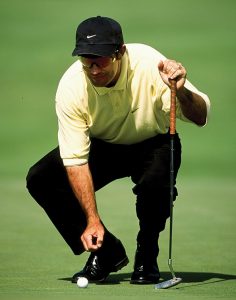PAUL Gow is glad golfers are no longer to be punished by one of the most controversial rules in golf: accidentally moving a ball on the putting green. And it’s not because the rule cost him victory on the US PGA Tour 16 years ago.
From January 1, 2017, the R&A and USGA introduced a new local rule that eliminates the penalty when a ball or ball-marker is accidentally moved on the putting green by the player, his partner, his opponent, or any of their caddies or equipment.
It comes in the aftermath of a farcical situation during Dustin Johnson’s final round at last year’s US Open at Oakmont where he was assessed a one-stroke penalty.
“I’m happy it’s gone. It was a dumb rule,” says Gow. “There’s common sense that prevails and it’s not that Dustin meant to do it. I’m happy with that rule changing.”
But it’s little consolation for the former touring pro who accidentally caused his ball to move during the second round of the B.C. Open in 2001. It proved a very costly mistake as Gow lost a playoff to America’s Jeff Sluman. He therefore missed out on a two-year exemption and $US144,000 – the difference between first and second place.

So what really happened?
After struggling during his first six months on the US PGA Tour, Gow arrived at En-Joie Golf Club in Endicott, New York, with a sense of purpose. He had re-read some old notes given to him by coach Gary Edwin from their first lesson together seven years earlier. Now he was flushing it.
Staged simultaneously with the British Open, the B.C. Open presented a wonderful opportunity to make an impression while the world’s best were at Royal Lytham & St Annes (where David Duval won his only Major).
After opening with a 3-under 69, Gow came to the 11th hole on Friday afternoon at 7-under for the tournament. After missing the green with his approach, Gow hit a poor chip shot that finished six feet from the hole. He then allowed his emotions to boil over.
As he went to mark his ball, Gow threw an Australian 5-cent coin on the ground in disgust … and hit the ball dead centre. It moved an inch, requiring a one-stroke penalty. After calling for a rules official, Gow returned the ball to its original position. He then missed the six-footer and tapped in for double-bogey.
“I was throwing the coin on the ground,” recalls Gow. “I wish I aimed at the ball because I probably would have missed.”
The incident did spark Gow into action and he proceeded to birdie five of his next seven holes to reach the halfway mark at 10-under and five shots off the lead.
Gow shot 66-66 over the weekend to tie Sluman at 22-under-par. He had a chance to win on the first playoff hole but left a 15-foot birdie putt hanging on the lip. On the second extra hole, Gow’s tee shot ricocheted backwards off a tree and across the fairway into a stream. He made 5 to hand Sluman the title and winner’s cheque for $US360,000.
So did that temperamental coin toss cost Gow the tournament?
“Yes it did, without a doubt. I was playing so well then,” says Gow who realises he let a massive opportunity slip through his fingers.
Gow never did win on the US PGA Tour, but he still jointly holds the record for most birdies in a 72-hole tournament (32 at the B.C. Open).


